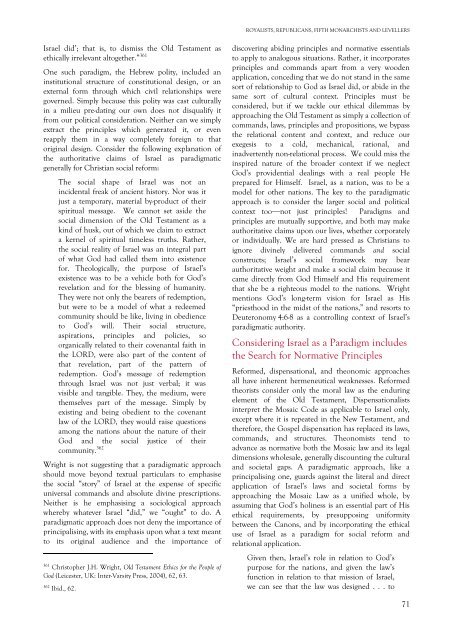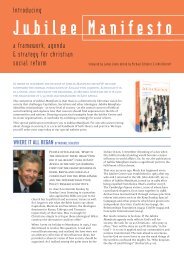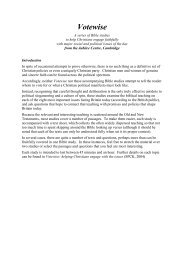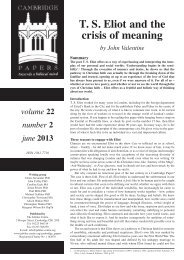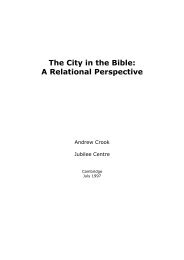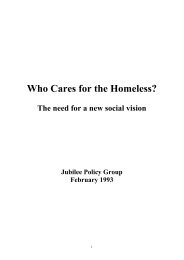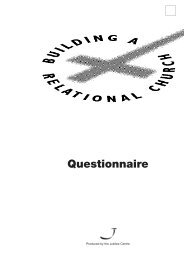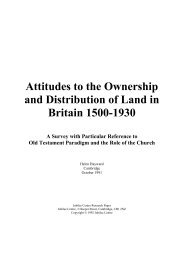Report Template - Jubilee Centre
Report Template - Jubilee Centre
Report Template - Jubilee Centre
Create successful ePaper yourself
Turn your PDF publications into a flip-book with our unique Google optimized e-Paper software.
ROYALISTS, REPUBLICANS, FIFTH MONARCHISTS AND LEVELLERS<br />
Israel did’; that is, to dismiss the Old Testament as<br />
ethically irrelevant altogether.” 361<br />
One such paradigm, the Hebrew polity, included an<br />
institutional structure of constitutional design, or an<br />
external form through which civil relationships were<br />
governed. Simply because this polity was cast culturally<br />
in a milieu pre-dating our own does not disqualify it<br />
from our political consideration. Neither can we simply<br />
extract the principles which generated it, or even<br />
reapply them in a way completely foreign to that<br />
original design. Consider the following explanation of<br />
the authoritative claims of Israel as paradigmatic<br />
generally for Christian social reform:<br />
The social shape of Israel was not an<br />
incidental freak of ancient history. Nor was it<br />
just a temporary, material by-product of their<br />
spiritual message. We cannot set aside the<br />
social dimension of the Old Testament as a<br />
kind of husk, out of which we claim to extract<br />
a kernel of spiritual timeless truths. Rather,<br />
the social reality of Israel was an integral part<br />
of what God had called them into existence<br />
for. Theologically, the purpose of Israel’s<br />
existence was to be a vehicle both for God’s<br />
revelation and for the blessing of humanity.<br />
They were not only the bearers of redemption,<br />
but were to be a model of what a redeemed<br />
community should be like, living in obedience<br />
to God’s will. Their social structure,<br />
aspirations, principles and policies, so<br />
organically related to their covenantal faith in<br />
the LORD, were also part of the content of<br />
that revelation, part of the pattern of<br />
redemption. God’s message of redemption<br />
through Israel was not just verbal; it was<br />
visible and tangible. They, the medium, were<br />
themselves part of the message. Simply by<br />
existing and being obedient to the covenant<br />
law of the LORD, they would raise questions<br />
among the nations about the nature of their<br />
God and the social justice of their<br />
community. 362<br />
Wright is not suggesting that a paradigmatic approach<br />
should move beyond textual particulars to emphasise<br />
the social “story” of Israel at the expense of specific<br />
universal commands and absolute divine prescriptions.<br />
Neither is he emphasising a sociological approach<br />
whereby whatever Israel “did,” we “ought” to do. A<br />
paradigmatic approach does not deny the importance of<br />
principalising, with its emphasis upon what a text meant<br />
to its original audience and the importance of<br />
361<br />
Christopher J.H. Wright, Old Testament Ethics for the People of<br />
God (Leicester, UK: Inter-Varsity Press, 2004), 62, 63.<br />
362<br />
Ibid., 62.<br />
discovering abiding principles and normative essentials<br />
to apply to analogous situations. Rather, it incorporates<br />
principles and commands apart from a very wooden<br />
application, conceding that we do not stand in the same<br />
sort of relationship to God as Israel did, or abide in the<br />
same sort of cultural context. Principles must be<br />
considered, but if we tackle our ethical dilemmas by<br />
approaching the Old Testament as simply a collection of<br />
commands, laws, principles and propositions, we bypass<br />
the relational content and context, and reduce our<br />
exegesis to a cold, mechanical, rational, and<br />
inadvertently non-relational process. We could miss the<br />
inspired nature of the broader context if we neglect<br />
God’s providential dealings with a real people He<br />
prepared for Himself. Israel, as a nation, was to be a<br />
model for other nations. The key to the paradigmatic<br />
approach is to consider the larger social and political<br />
context too—not just principles! Paradigms and<br />
principles are mutually supportive, and both may make<br />
authoritative claims upon our lives, whether corporately<br />
or individually. We are hard pressed as Christians to<br />
ignore divinely delivered commands and social<br />
constructs; Israel’s social framework may bear<br />
authoritative weight and make a social claim because it<br />
came directly from God Himself and His requirement<br />
that she be a righteous model to the nations. Wright<br />
mentions God’s long-term vision for Israel as His<br />
“priesthood in the midst of the nations,” and resorts to<br />
Deuteronomy 4:6-8 as a controlling context of Israel’s<br />
paradigmatic authority.<br />
Considering Israel as a Paradigm includes<br />
the Search for Normative Principles<br />
Reformed, dispensational, and theonomic approaches<br />
all have inherent hermeneutical weaknesses. Reformed<br />
theorists consider only the moral law as the enduring<br />
element of the Old Testament, Dispensationalists<br />
interpret the Mosaic Code as applicable to Israel only,<br />
except where it is repeated in the New Testament, and<br />
therefore, the Gospel dispensation has replaced its laws,<br />
commands, and structures. Theonomists tend to<br />
advance as normative both the Mosaic law and its legal<br />
dimensions wholesale, generally discounting the cultural<br />
and societal gaps. A paradigmatic approach, like a<br />
principalising one, guards against the literal and direct<br />
application of Israel’s laws and societal forms by<br />
approaching the Mosaic Law as a unified whole, by<br />
assuming that God’s holiness is an essential part of His<br />
ethical requirements, by presupposing uniformity<br />
between the Canons, and by incorporating the ethical<br />
use of Israel as a paradigm for social reform and<br />
relational application.<br />
Given then, Israel’s role in relation to God’s<br />
purpose for the nations, and given the law’s<br />
function in relation to that mission of Israel,<br />
we can see that the law was designed . . . to<br />
71


